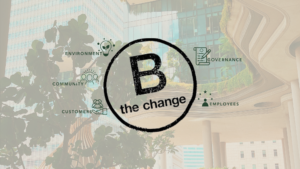Let’s talk about why ESG–a set of principles that elevate Environmental, Social, and Governance issues in business–isn’t the boogeyman some folks are making it out to be recently. ESG is more like a guide getting us all to a better future.
If you’ve ever been on a wilderness trip, you know there are points when your guide is definitely not your favorite person. Your guide asked you to paddle harder in choppy waters to get to safety in a storm. Push through exhaustion to reach a campsite. But just the same, paddling harder and pushing through left you feeling happy, proud, stronger.
ESG is the guide that’s getting us to a better future with stronger businesses. But the anti-ESG movement is sowing doubt. So grab your coffee or a cocktail and let’s bust some anti-ESG myths, shall we?
1. ESG & Extractive Industries: Preparing for the Future
You might have heard that ESG is out to kill industries like oil and gas. But here’s the deal: ESG isn’t here to kill these industries; it’s here to help them thrive in the renewable energy era. Instead of being a roadblock, ESG is creating the path for them to participate in the opportunities of the future.
Consider the oil and gas companies investing in renewables R&D and building the capabilities to compete and thrive in the renewables economy. They’re not just being environmentally responsible in adopting these ESG practices; they’re securing their spot in the evolving energy landscape. By embracing change, these companies are safeguarding jobs and creating new ones in new sectors.
ESG isn’t the problem for these industries – it’s the solution for their more sustainable and secure future.
2. Not Politics, Just Progress
I’m not much of a conspiracy theorist, so let’s tackle the idea that ESG is secretly plotting to undermine conservative policies and industries. Nope. ESG is simply a way to raise the bar for all businesses when it comes to healing the planet we all live on, uplifting the communities that make up our stakeholders, and managing our businesses well to reduce legal and ethical risks. It’s about doing the right thing, regardless of your political stripes.
ESG doesn’t have a political agenda. It’s simply about good business and a sustainable, secure future. When companies follow ESG standards, they’re showing their commitment to ethical and sustainable practices. It’s not about politics, it’s about building a world where everyone can thrive. It’s our ally in creating a better future, which (I would imagine) is a pretty bipartisan issue, don’t you think?
3. Boosting Fairness & Ethics
Some critics say ESG standards mess with state codes and fair labor practices. Nope. Remember, the G in ESG is for Governance. ESG is inherently pro-fairness and ethical behavior. It encourages companies to treat their employees, customers, and communities with respect. Transparency and accountability reduce risk for businesses and ensure sustained positive outcomes, not just a great next quarter at any cost to the company’s future (which is arguably the anti-ESG approach).
Model legislation is popping up around the country aimed at making ESG-based operations more difficult. It’s critical, though, that all businesses have the freedom to operate in ways that benefit their bottom line and create significant social and environmental value. Of course, that also means businesses should have the freedom to choose the “good next quarter at any cost” approach if they wish. After all, having that choice is a testament to the measured freedom and flexibility American businesses are supposed to enjoy.
But history has shown that businesses prioritizing quick wins over long-term sustainability find themselves facing detrimental challenges sooner rather than later. On the other hand, history has also shown that embracing ESG-based operating models opens doors to increased returns and long-term success. Anti-ESG policies are only convenient for those looking for short-term and personal gains.
4. It’s Not Woke, It’s Just Having Values
Along the same lines as fairness and ethics, ESG is all about diversity, equity, inclusion, fair wages, and safe workplaces. These are values that should make us all smile, not cause political angst. When companies participate in ESG, they’re less likely to run into trouble with labor disputes and ethical blunders. Put simply, they’re being responsible citizens that value people, the planet, and profit in equal measure.
Those first three values–collectively DEI–are triggering for those they scare. But there’s a price to being afraid to uplift others. As a DEI expert put it to me in a recent conversation, when companies implement effective DEI practices, they’re building a bigger funnel for talent, customers, and investors than their competitors who don’t. Not to mention, of course, the moral, ethical, and simply human reasons to implement DEI practices.
The point is this – having values that serve and uplift historically marginalized people isn’t “woke.” It’s just being good to others and uplifting humanity collectively. Which, it turns out, is pretty good for business.
The Hero We Need
The anti-ESG movement has it’s wires crossed. Its roots are in short-term political and financial interests for individuals. ESG’s roots, on the other hand, are in long-term economic, social, and environmental interests of the masses. ESG isn’t the villain, it’s the hero we need. It’s a positive force pushing companies toward sustainability, scaling their benefit to society, the environment, and their own bottom line. It’s that trip guide getting us safely to our next beautiful campsite.
Choosing ESG isn’t just the right thing to do – it’s a smart business move that sets us on a path to a brighter, more sustainable future. So let’s get on board with ESG and work together to make the world a better place for everyone, especially our future generations.






